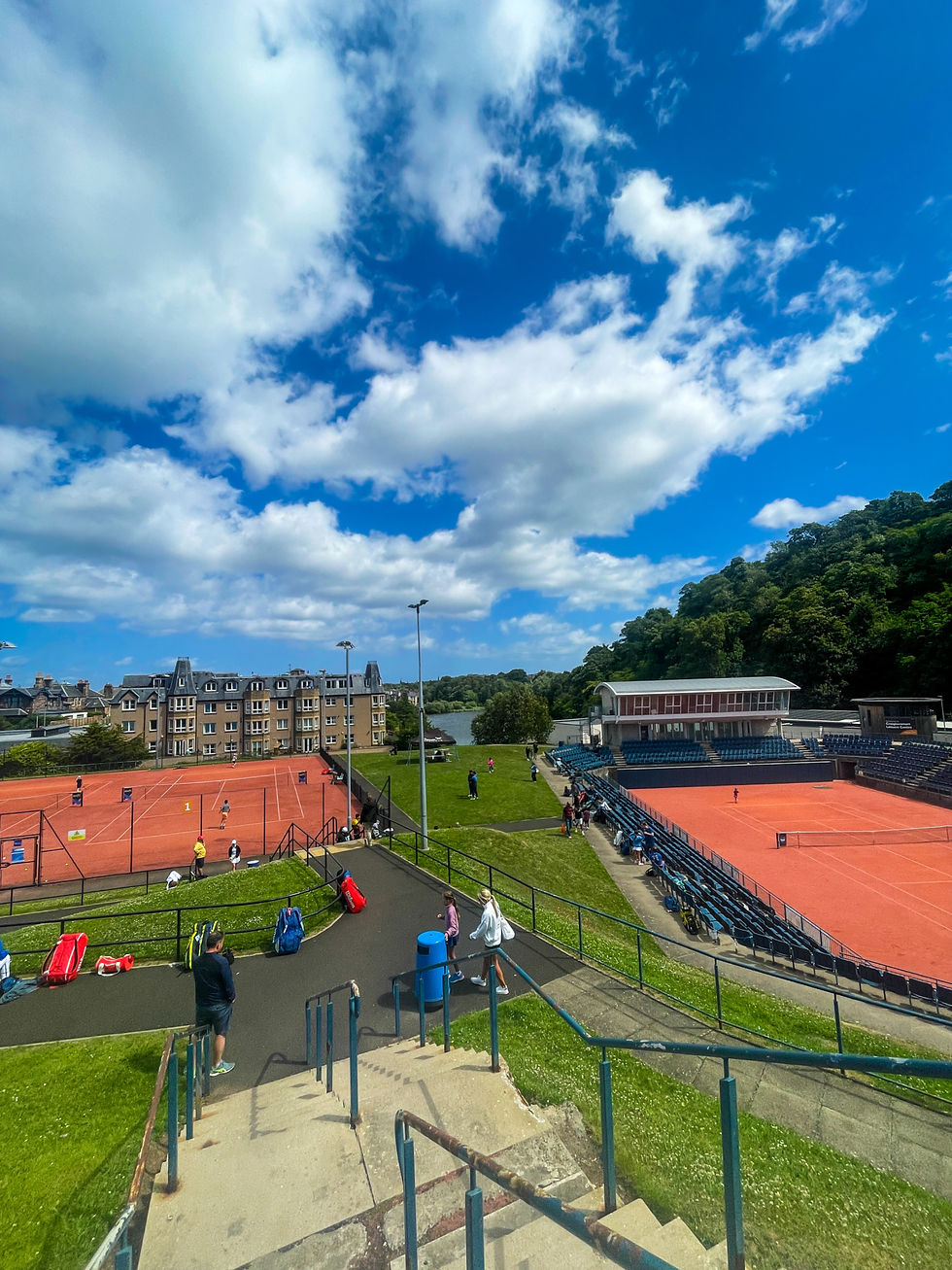Fuelling the Future - Lessons Learned from the Courts of Villeneuve-Loubet
- Nicola Tweedy
- May 26, 2025
- 4 min read
Nine Days in Nice: What a Tennis Tour Taught Me About Youth Athlete Nutrition
As a sports nutritionist, I often work behind the scenes, advising on fuelling plans, recovery strategies, and aiming to mould behaviour in order to optimise performance through food. Spending nine days at a Category 1 U12 Tennis Europe event in Nice offered far more than just lessons in tennis, it revealed how deeply nutrition habits can impact performance, mood, energy, and recovery.
Here’s what stood out, both as observations and as guiding takeaways for future development.

1. Consistency > Perfection
Field Insight: Many young athletes lack consistent fuelling. If meals are skipped due to nerves or time pressure, or players snack on high-sugar foods with little nutrient density, the result is erratic energy, poor recovery, and lower performance consistency.
Physiological Reality: Children and adolescents have higher relative energy needs than adults due to rapid growth and high activity levels. Irregular fuelling disrupts blood glucose levels and glycogen replenishment, affecting both cognitive and physical output.
Recommendation: Encourage consistent, balanced meals throughout the day:
Carbohydrates (e.g., oats, pasta, potatoes) to support glycogen stores
Protein (e.g., lean meats, dairy, legumes) for muscle repair and growth
Healthy fats (e.g., olive oil, nuts, seeds) to support hormonal health and satiety
The goal is not dietary perfection, it is creating habits that keep energy and mood stable over long tournament weeks.
2. Pre-Match Nutrition Is Often Overlooked
Field Insight: Many players under-fuel for morning matches, often because of pre-match anxiety, poor appetite, or unfamiliar routines.
Scientific Context: Low pre-match carbohydrate availability is linked to faster fatigue, reduced focus, and impaired thermoregulation. Young athletes are especially vulnerable due to smaller glycogen stores.
Recommendation: Establish a simple pre-match routine 1–2 hours before play, ideally including:
Low glycemic carbs for steady energy:
Porridge
Wholegrain toast with banana/egg
Low-sugar cereal with milk
Fruit and granola with milk
Light, digestible meals help maintain blood glucose levels and prevent early fatigue.
3. Hydration Habits Need Intentional Training
Field Insight: Even in hot and intense playing conditions, hydration is often reactive, not proactive. Few players have hydration routines outside of match play.
Scientific Context: Even 1–2% dehydration can reduce aerobic capacity and cognitive performance. Children have a reduced thirst response and generate more heat during exercise, increasing dehydration risk.
Recommendation: Make hydration habitual, not situational:
Drink regularly from wake-up onwards—not just when thirsty
Monitor urine colour as a simple hydration gauge
Encourage small sips every 15–20 minutes during warm-up and between games
4. Post-Match Recovery Is Frequently Skipped
Field Insight: After long matches or tough losses, players are prone to skipping recovery foods due to fatigue, low appetite, or emotional upset.
Scientific Context: Recovery nutrition within 30 minutes is critical to replenish glycogen, repair muscle, and rehydrate. This window is especially important for young athletes who may compete again within 24 hours.
Recommendation: Aim for a high carb + protein combo post-match:
Chocolate milk
Tuna wrap or chicken sandwich
Fruit smoothie with yogurt
Cereal bar, banana and yoghurt
Breadsticks and hummus
Even a small snack is better than nothing. The goal is to initiate the recovery process quickly, even when emotions are high.
5. Food Flexibility Is a Skill
Field Insight: Many players are unsettled by unfamiliar foods abroad—different breakfasts, alternate meal times, fewer “safe” options.
Scientific Context: The ability to adapt to new food environments is crucial in tournament settings, especially during international competition. Poor intake due to unfamiliarity can lead to energy deficits and micronutrient gaps.
Recommendation: Help players become strategic eaters, not just selective eaters. Players need to be flexible and willing to eat to fuel rather than only eat their favourite foods if they want to maintain performance internationally in the long term.
Normalise trying new but functional foods (e.g., bread/rice/pasta, local cheeses & meats, hard-boiled eggs)
Pack familiar snacks from home (cereal bars, dried fruit, crackers)
Teach the difference between eating for fuel and eating for pleasure or comfort.
Nutrition literacy includes being able to problem-solve with food, not just follow a meal plan. More emphasis needs to be put on helping players to understand the importance of fuelling and being a little more tough.
6. Planned Snacks Prevent Unforced Errors
Field Insight: Unplanned hunger often leads to poor choices: sugary treats, high-fat snacks, or skipping food altogether when matches run late.
Scientific Context: Strategic snacking stabilises blood sugar and maintains muscle protein synthesis between meals. This is especially important during prolonged tournament weeks.
Recommendation: Make snacks intentional and portable:
Trail mix
Wholegrain crackers
Cereal bars
Rice cakes
Pretzels
Breadsticks
Encourage players to always have a snack in their bag—whether or not they think they’ll need it.
7. Rethinking Sugar “Fixes”
Field Insight: Under pressure or fatigue, players are more likely to default to sugary solutions - energy drinks, chocolate bars, sweets.
Scientific Context: Rapid sugar leads to a blood glucose spike followed by a crash, which dampens concentration, coordination, and mood.
Recommendation: Educate players about the glycemic response.
Prioritise natural sugars with fibre / protein (fruit + yogurt, banana + peanut butter)
Use diluted juice with salt as a DIY electrolyte/sports drink
Ask: Am I eating this for energy, comfort, or boredom?
This kind of awareness supports self-regulation and smarter decision-making under pressure.
Final Word
Nutrition on the road is not a nice-to-have, it is a foundational performance pillar. Young athletes who understand how to fuel, recover and adapt through food develop not only stronger bodies but sharper minds, steadier moods, and longer athletic careers. By embedding these principles early, we are not just creating better players, we are shaping more resilient, self-aware young people who can own their performance both on and off the court.




Comments